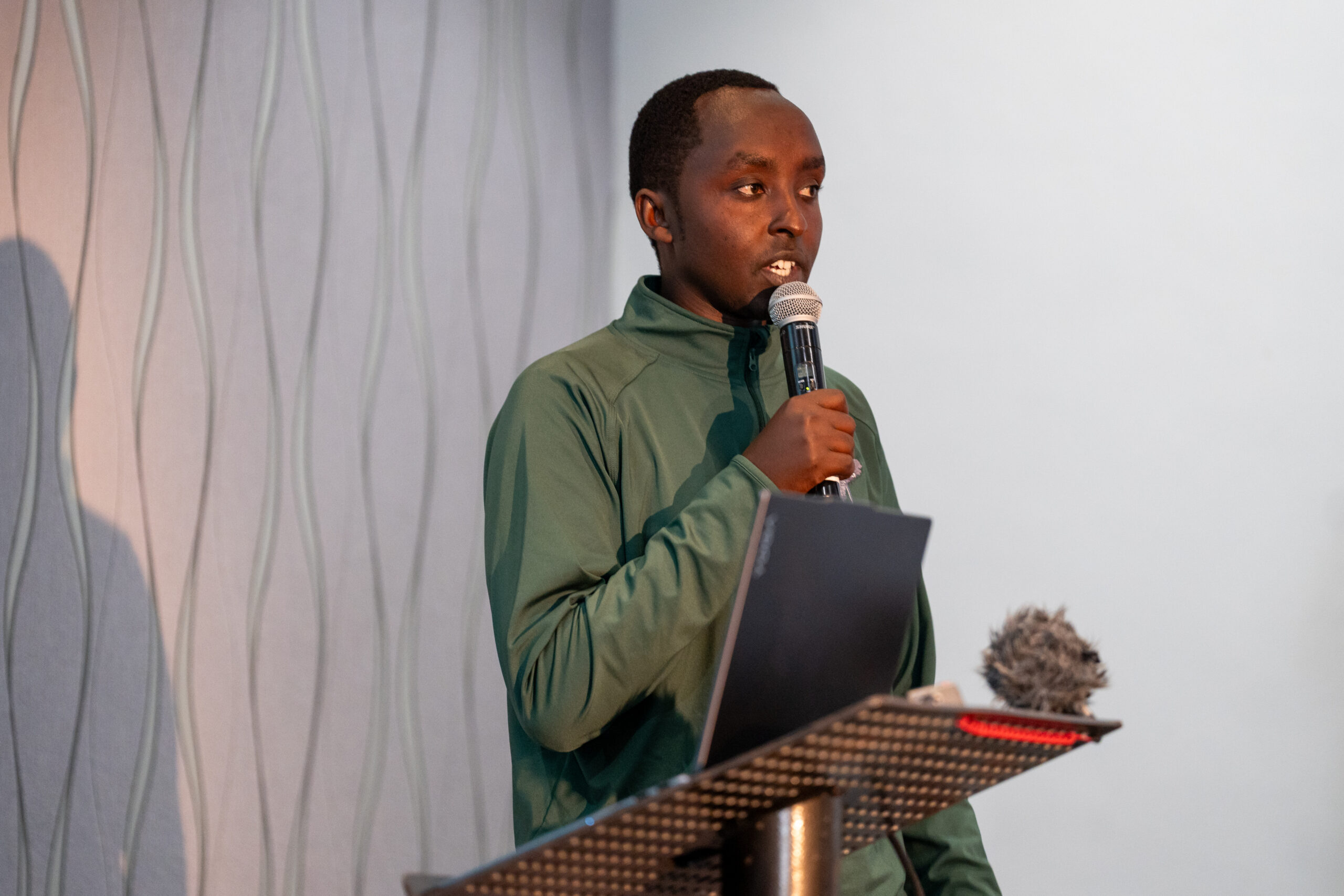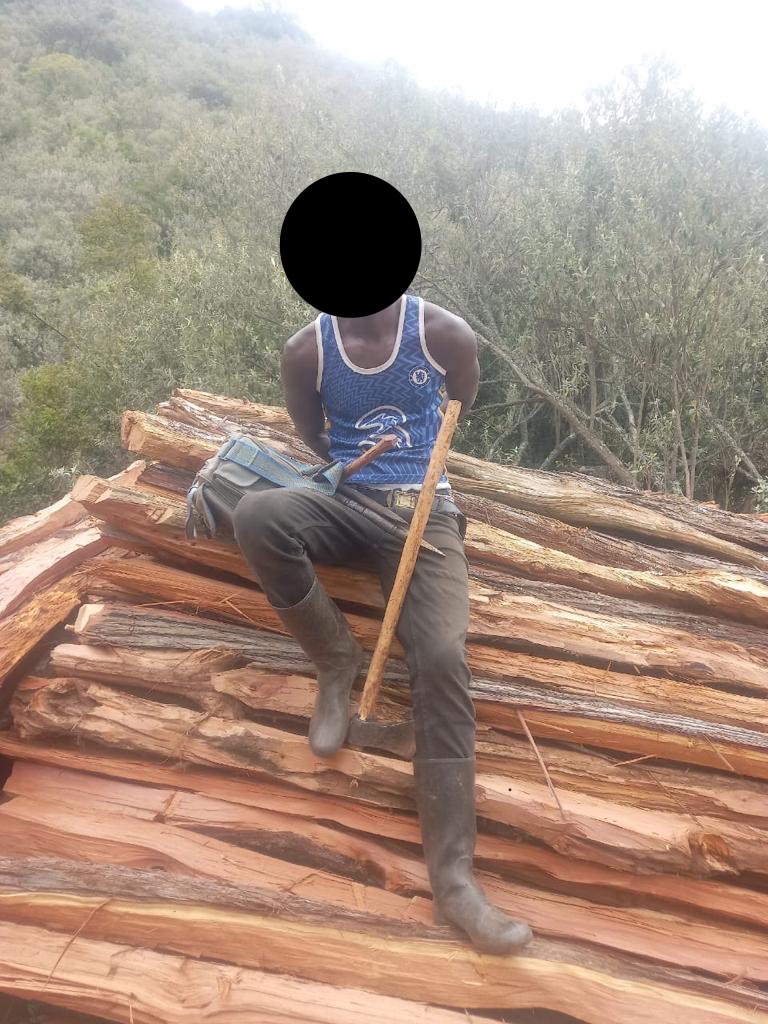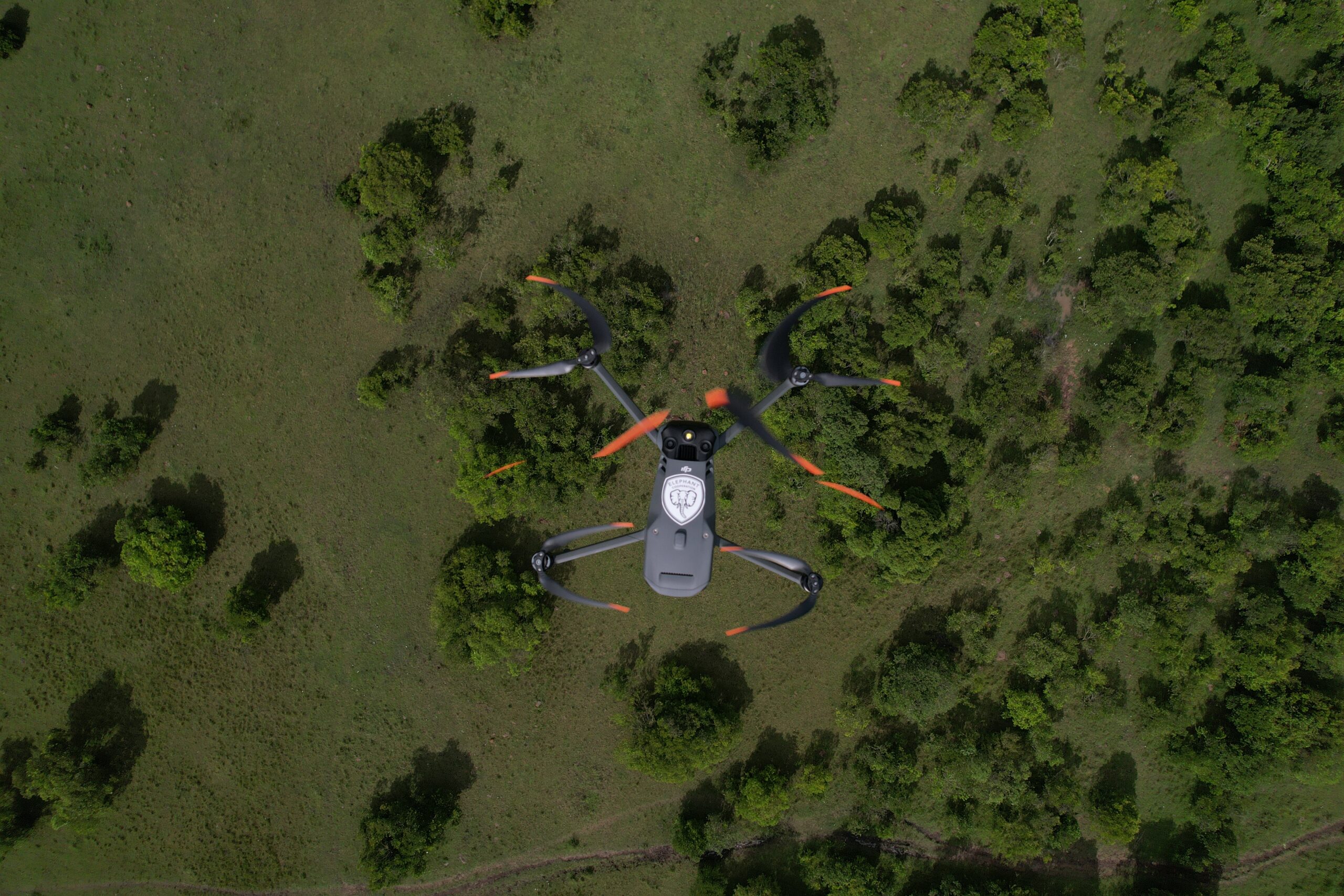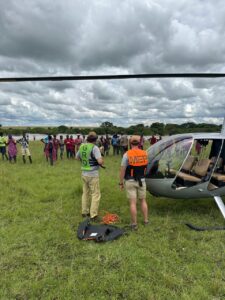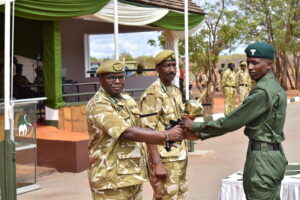 In November, fifteen MEP rangers completed advanced training at the Kenya Wildlife Service (KWS) Law Enforcement Academy. The intense 3-month course meant to advance their skills in areas of bush craft, navigation, disaster management, first aid, community engagement and more concluded this week with a passing out ceremony (graduation). MEP rangers were joined at the ceremony by over 50 other Kenyan wildlife rangers and 100 guests all presided over by KWS Director General Dr. Erastus Kanga, HSC. MEP rangers Lesikar, Melami, Dickson, Gloria, Brendah, Daniel, Benson, Stanley, Maitoyo, Alex, Latiff, Raymond, Fancy and Willy will soon return to the Mara to deploy their new skills in the field and pass them along to their colleagues. A very special thanks to all of the donors including How Many Elephants for supporting their advanced training.
In November, fifteen MEP rangers completed advanced training at the Kenya Wildlife Service (KWS) Law Enforcement Academy. The intense 3-month course meant to advance their skills in areas of bush craft, navigation, disaster management, first aid, community engagement and more concluded this week with a passing out ceremony (graduation). MEP rangers were joined at the ceremony by over 50 other Kenyan wildlife rangers and 100 guests all presided over by KWS Director General Dr. Erastus Kanga, HSC. MEP rangers Lesikar, Melami, Dickson, Gloria, Brendah, Daniel, Benson, Stanley, Maitoyo, Alex, Latiff, Raymond, Fancy and Willy will soon return to the Mara to deploy their new skills in the field and pass them along to their colleagues. A very special thanks to all of the donors including How Many Elephants for supporting their advanced training.
On November 21, MEP staff took part in a snake bites and handling training at MEP HQ hosted by East African Reptiles – Taylor Ashe Antivenom Foundation. There are over 140 known species of snakes in Kenya and 33 of those are venomous. The training covered how to identify snake species, snake bite first aid procedures and the basics of snake removal, all important information for our rangers and researchers to know as they encounter snakes while in the field. Not just that, but as MEP Ranger Purity Masuntu says, “the knowledge we learned will be very useful not only to our operations but also in the communities we come from.”
MEP rangers conducted a 2-day training for 10 security officers from Asilia’s Encounter Mara Camp in November. The training covered medical emergency procedures, fire training, security, patrols, securing a crime scene, powers of arrest among other topics aimed at enhancing their work and continued protection of the camps and the guests. We are grateful for our partnership with Asilia over the years and their support of our elephant conservation work.
 Members of the Mara Elephant Project team joined over 400 people from conservation organizations around the globe at the EarthRanger User Conference hosted in Cape Town. MEP Special Projects Manager Wilson Sairowua presented about using drones as a tool for conflict mitigation and wildlife monitoring and over 60% of conference participants attended his lively session. Alongside partners, he presented on how technology is being used to solve conservation challenges. MEP Director of Research and Conservation Dr. Jake Wall, co-founder of EarthRanger, presented about Ecoscope, a MEP developed technology, and was honored to be invited to sit alongside conservation partners for the Elephant Protection Initiative panel discussing elephant conservation. Thank you EarthRanger for including MEP at this growing conference. “Compared with the first user conference in 2015 when there were about 15 of us, this conference has grown to nearly 450 attendees representing 500 sites globally in over 64 countries, says Dr. Wall. “It’s been a very exciting program to have been involved with from the start.” MEP also hosted several members of the EarthRanger team at our headquarters in Lemek Conservancy after the conference. The team got an opportunity to learn more about MEP and how we are using EarthRanger to safeguard wildlife, their habitats, and people.
Members of the Mara Elephant Project team joined over 400 people from conservation organizations around the globe at the EarthRanger User Conference hosted in Cape Town. MEP Special Projects Manager Wilson Sairowua presented about using drones as a tool for conflict mitigation and wildlife monitoring and over 60% of conference participants attended his lively session. Alongside partners, he presented on how technology is being used to solve conservation challenges. MEP Director of Research and Conservation Dr. Jake Wall, co-founder of EarthRanger, presented about Ecoscope, a MEP developed technology, and was honored to be invited to sit alongside conservation partners for the Elephant Protection Initiative panel discussing elephant conservation. Thank you EarthRanger for including MEP at this growing conference. “Compared with the first user conference in 2015 when there were about 15 of us, this conference has grown to nearly 450 attendees representing 500 sites globally in over 64 countries, says Dr. Wall. “It’s been a very exciting program to have been involved with from the start.” MEP also hosted several members of the EarthRanger team at our headquarters in Lemek Conservancy after the conference. The team got an opportunity to learn more about MEP and how we are using EarthRanger to safeguard wildlife, their habitats, and people.
 Also, MEP was proud to participate in a new holiday in Kenya, National Tree Growing Day. MEP rangers and the members of the long-term monitoring (LTM) team distributed seedballs from Seedballs Kenya on the ground while the MEP helicopter dropped them from the air on degraded areas. Overall, the MEP team spread 60,000 seedballs with acacia seeds, which provide a range of ecosystem services and other benefits like food for wildlife, nesting sites for birds and insects and they are renowned for their use in traditional medicine in Kenya. MEP is proud to support the government’s landscape and ecosystem restoration goal of growing 15 billion trees.
Also, MEP was proud to participate in a new holiday in Kenya, National Tree Growing Day. MEP rangers and the members of the long-term monitoring (LTM) team distributed seedballs from Seedballs Kenya on the ground while the MEP helicopter dropped them from the air on degraded areas. Overall, the MEP team spread 60,000 seedballs with acacia seeds, which provide a range of ecosystem services and other benefits like food for wildlife, nesting sites for birds and insects and they are renowned for their use in traditional medicine in Kenya. MEP is proud to support the government’s landscape and ecosystem restoration goal of growing 15 billion trees.
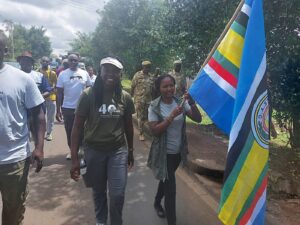 MEP participated in the #IvoryBelongsToElephants East and Central Africa walk, which ended in Nairobi after a 3,200 km journey across Kenya, Uganda, Rwanda and DRC Congo.
MEP participated in the #IvoryBelongsToElephants East and Central Africa walk, which ended in Nairobi after a 3,200 km journey across Kenya, Uganda, Rwanda and DRC Congo.
Over the month of November, the MEP/ Sheldrick Wildlife Trust (SWT) Mau De-Snaring Units together with partners KWS and Kenya Forest Service (KFS) removed a total of 108 snares, mitigated six human elephant conflict incidents by moving elephants away from farms bordering the forest, confiscated 113 pieces of illegal timber and made three arrests. The ‘Alpha’ and ‘Charlie’ teams are committed to ensuring the Mau Forest is protected.





 Overall, in November, MEP rangers alongside government partners arrested five habitat destruction suspects and removed 122 snares. They also confiscated 153 pieces of timber, 1,921 posts, destroyed eight charcoal kilns and mitigated 27 conflict incidents. In November, MEP rangers covered a distance 1,480 km on foot and 11,657.51 km by car in the GME.
Overall, in November, MEP rangers alongside government partners arrested five habitat destruction suspects and removed 122 snares. They also confiscated 153 pieces of timber, 1,921 posts, destroyed eight charcoal kilns and mitigated 27 conflict incidents. In November, MEP rangers covered a distance 1,480 km on foot and 11,657.51 km by car in the GME.
 November was a busy month for all drone pilots, as the number of conflicts incidents remained high. The mobile ranger team base in Ol Kinyei continued their search for Lempiris, the collared elephant, whose collar battery had depleted. The Lima ranger team in Mosiro played a crucial role in pushing larger elephant herd out of settlements, contributing to the efforts of mitigating conflict.
November was a busy month for all drone pilots, as the number of conflicts incidents remained high. The mobile ranger team base in Ol Kinyei continued their search for Lempiris, the collared elephant, whose collar battery had depleted. The Lima ranger team in Mosiro played a crucial role in pushing larger elephant herd out of settlements, contributing to the efforts of mitigating conflict.
 The MEP helicopter is a vital tool not just for our organization but to support our partners as well. On November 15, we assisted KWS Vet Dr. Njoroge from the SWT Mobile Vet Unit in the air and on the ground with two elephant treatments. The first, a female with a spear wound and the second a female with a snare wrapped around her leg. Both treatments were successful.
The MEP helicopter is a vital tool not just for our organization but to support our partners as well. On November 15, we assisted KWS Vet Dr. Njoroge from the SWT Mobile Vet Unit in the air and on the ground with two elephant treatments. The first, a female with a spear wound and the second a female with a snare wrapped around her leg. Both treatments were successful.
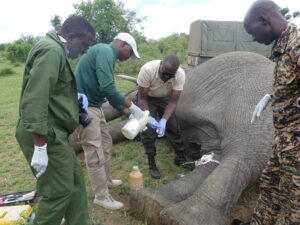 Collared elephant David is a transboundary elephant MEP, KWS and WRTI monitor to better understand how he’s navigating an increasingly complex landscape and respond to conflict. While David spends 90% of his time in Kenya near the Sand River, he does move into Tanzania where our protection efforts stop. After receiving an alert from his tracking collar that David crossed back into Kenya in November, the MEP long-term monitoring team set out to monitor him in the field. What they discovered was a wound on his back leg that needed immediate vet intervention. Our partner KWS Vet Dr. Njoroge from the SWT Mobile Vet Unit responded and successfully treated his wound.
Collared elephant David is a transboundary elephant MEP, KWS and WRTI monitor to better understand how he’s navigating an increasingly complex landscape and respond to conflict. While David spends 90% of his time in Kenya near the Sand River, he does move into Tanzania where our protection efforts stop. After receiving an alert from his tracking collar that David crossed back into Kenya in November, the MEP long-term monitoring team set out to monitor him in the field. What they discovered was a wound on his back leg that needed immediate vet intervention. Our partner KWS Vet Dr. Njoroge from the SWT Mobile Vet Unit responded and successfully treated his wound.
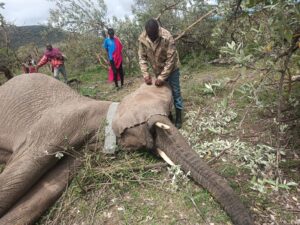 During the last week of November, both Clara and Audrey received new tracking collars to allow MEP, KWS and the Wildlife Research and Training Institute (WRTI) to continue their 24/7 monitoring. Clara and Audrey can oftentimes be found in each other’s company sometimes combining family herds with another collared elephant Indy. Their continued monitoring allows us to rapidly respond to conflict and better understand the connectivity between the Rift Valley, Loita Plains and the Mara through an area where infrastructure is expanding. MEP CEO Marc Goss partnered with KWS Vet Dr. Njoroge for both operations and the MEP helicopter was an essential tool. Clara was in thick bush with her herd of 20 and needed to be moved out to a clearing for the operation and Audrey was on a plateau near a high conflict area with a herd of 60 elephants. Both were also fitted with the latest solar powered elephant collar in hopes of extending the battery life. MEP and our partners aim to gain a more detailed understanding of how changing land use patterns are impacting elephants to better protect them and the communities that share a home.
During the last week of November, both Clara and Audrey received new tracking collars to allow MEP, KWS and the Wildlife Research and Training Institute (WRTI) to continue their 24/7 monitoring. Clara and Audrey can oftentimes be found in each other’s company sometimes combining family herds with another collared elephant Indy. Their continued monitoring allows us to rapidly respond to conflict and better understand the connectivity between the Rift Valley, Loita Plains and the Mara through an area where infrastructure is expanding. MEP CEO Marc Goss partnered with KWS Vet Dr. Njoroge for both operations and the MEP helicopter was an essential tool. Clara was in thick bush with her herd of 20 and needed to be moved out to a clearing for the operation and Audrey was on a plateau near a high conflict area with a herd of 60 elephants. Both were also fitted with the latest solar powered elephant collar in hopes of extending the battery life. MEP and our partners aim to gain a more detailed understanding of how changing land use patterns are impacting elephants to better protect them and the communities that share a home.
Collared elephants Fred, Audrey, Hannibal, Clara, Matali and Ivy were all monitored by MEP rangers in the month of November.
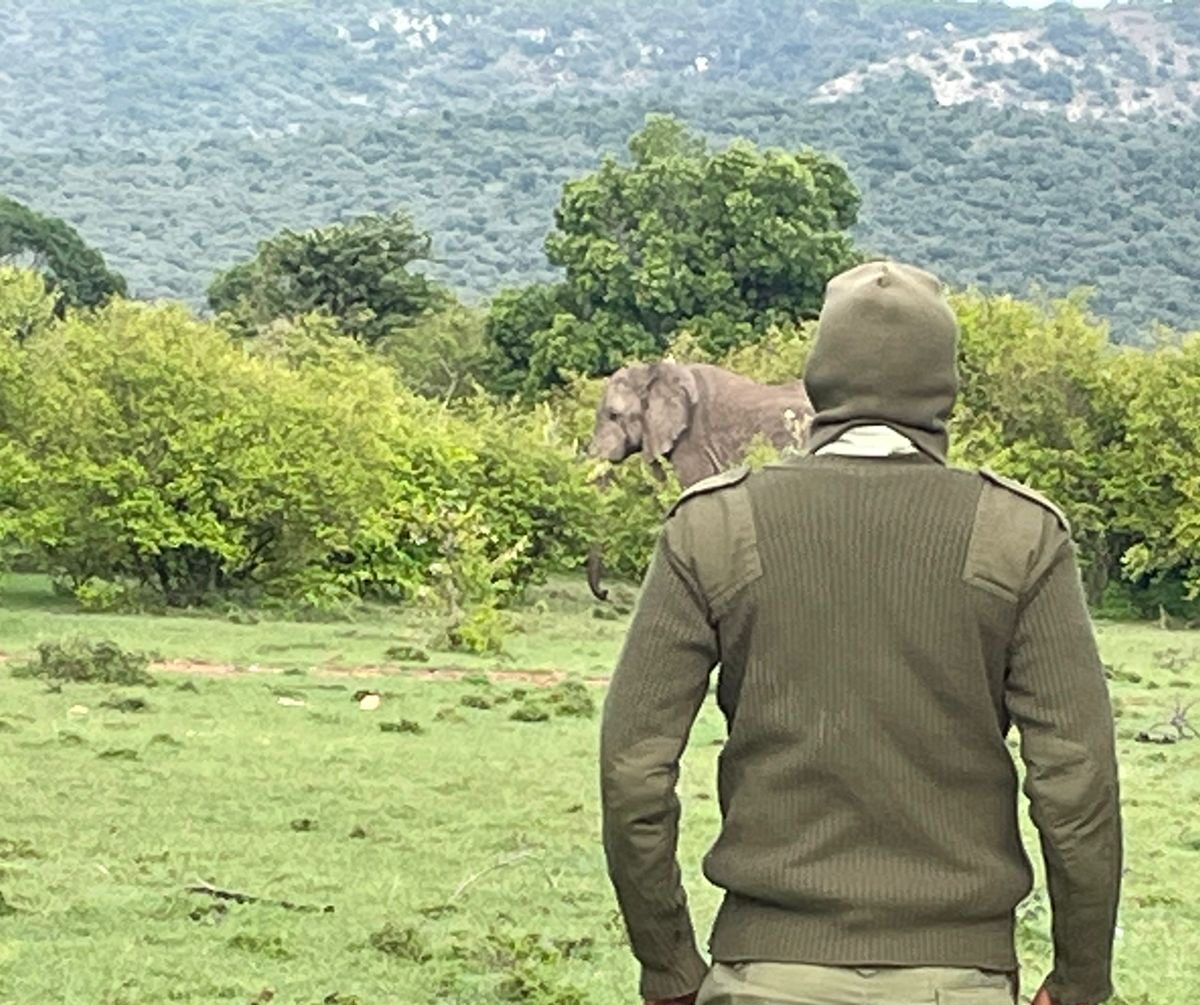



On the MEP Co-Existence Farm, the month of November was characterized by high rainfall, the rains helped most of the crops to sprout well and reduce predation, it also comes with disadvantages which includes water logging on some plots leading to the loss of the crop. The kitchen garden was upgraded as you can see on the left. The baseline social survey ended the second week of November, and it was a successful activity which allowed the coexistence project to take into account the views of the community in regard to new crop introduction and reduction of human-elephant conflict. Farm Manager Abigael attended the Africa Leadership Academy workshop put on by the Mastercard Foundation and Africa Career Networks.
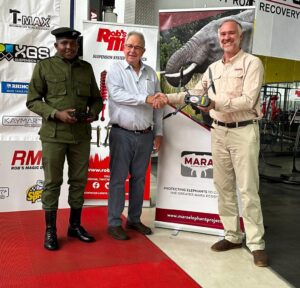 In November, we increased our aerial capacity after receiving three Mavic 3T drones with thermal capabilities generously donated by Elephant Cooperation and Romagecko Kenya Limited popularly known as ‘Rob’s Magic’. These drones significantly enhanced our capabilities and efficiency in monitoring and mitigating conflict, especially at night. KCAA conducted a night operation assessment of me in Nairobi, laying the groundwork for obtaining a night instructor rating in December. This development will further boost our mitigation and monitoring at night.
In November, we increased our aerial capacity after receiving three Mavic 3T drones with thermal capabilities generously donated by Elephant Cooperation and Romagecko Kenya Limited popularly known as ‘Rob’s Magic’. These drones significantly enhanced our capabilities and efficiency in monitoring and mitigating conflict, especially at night. KCAA conducted a night operation assessment of me in Nairobi, laying the groundwork for obtaining a night instructor rating in December. This development will further boost our mitigation and monitoring at night.
On Giving Tuesday, we celebrated the people that protect elephants and the ecosystem they share and thanks to your support we met our $50,000 match. We received a record amount of support for November this year and are extremely grateful. In November, The Maasai Mara Wildlife Conservancies Association received a $6.5 million GDA award from USAID in which MEP is listed as a local partner. The GDA award will be a fantastic opportunity for advancing ecosystem monitoring in the Mara.
We also launched our first ever merchandise collection with partner Imani + Kids. Each product is handcrafted in Kenya and features custom elephant designs. Your purchase supports MEP’s work to protect elephants and their habitats and Imani’s work to break the generational cycle of poverty through the transformation of women. Shop the entire collection here.




